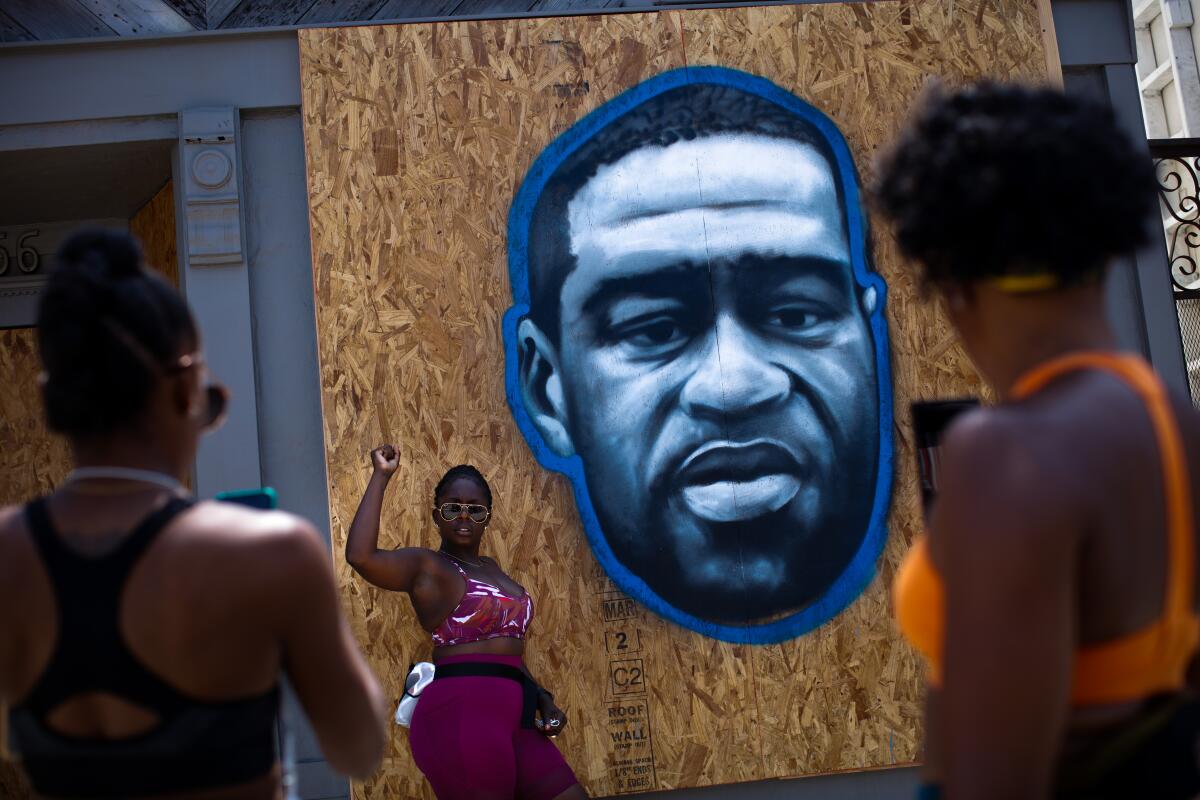Newsletter: Antiracist voices that drown out Trump

- Share via
Good morning. I’m Paul Thornton, and it is Saturday, June 6, 2020, the 76th anniversary of the Allied invasion of France commonly known as D-Day. Let’s take a look back at the week in Opinion.
Last week’s newsletter was titled, “The week when Trump tweets as we burn.” I guess that tempted Fate to remind us of this president’s limitless capacity for malevolence, as his administration had a few hundred people gassed so the dear leader could brandish a holy book in front of a boarded-up church. If this isn’t the most operatic display of President Trump’s authoritarian designs, I don’t know what is. Let’s hope I’m not writing about it in next week’s newsletter.
But far more compelling than the president’s autocratic impulses is the message of the protests that he and violently unhinged police forces across the country seek to quash: The illegal, extrajudicial execution of black people by law enforcement must end, and the systemic racism that has enabled it must be dismantled. The latter subject was taken up by the Los Angeles Times Editorial Board in a piece that recommended seven ways for Californians to fight racism.
A cure for the common opinion
Get thought-provoking perspectives with our weekly newsletter.
You may occasionally receive promotional content from the Los Angeles Times.
To that end, this week’s newsletter will amplify voices calling for the changes that can begin to get us moving in the right direction. In so doing, perhaps the ravings of our dangerous yet increasingly irrelevant commander in chief will become less audible amid discussions of productive policy proposals and the earnest chants of protesters.
We need to end the American culture of impunity. Police officers clad in riot gear have been caught on video wantonly beating and arresting peaceful protesters, betraying the very same law enforcement pathology that led to George Floyd’s death. We have a president who cannot perform even the basic functions of leadership in a crisis. “A doctor will tell you that bruises look worse before they get better, a fever rises before it can break and bring relief,” writes Nancy Gibbs. “America is bruised and fevered, and it is way past time to stop pretending everything is fine.” L.A. Times
Don’t understand the protests? Kareem Abdul-Jabbar says what you’re seeing is people pushed to the edge. If you’re white, you might have reacted to the death of George Floyd with sadness over the injustice of it all; if you’re black, you probably stood up and said, “Not *&#!&# again!” Writes the former Lakers great: “Yes, protests often are used as an excuse for some to take advantage, just as when fans celebrating a hometown sports team championship burn cars and destroy storefronts. I don’t want to see stores looted or even buildings burn. But African Americans have been living in a burning building for many years, choking on the smoke as the flames burn closer and closer.” L.A. Times
If George Floyd were white, he probably wouldn’t have been arrested in the first place. Floyd was believed to have paid a store clerk with a counterfeit $20 bill, an act that typically sparks an investigation but not an arrest, as it did with Floyd. But Floyd ended up dead, the result of a white cop calmly pressing a knee onto his neck for more than eight minutes as other officers prevented worried passersby from intervening. Those officers, meanwhile, initially went free, with no police cars swarming the scene to arrest them. So much for equal protection under the law, write law professors Nancy Gertner and Paul Butler. L.A. Times
Protesters skipped South L.A. and marched in white neighborhoods. Good for them. In April 1992, after the LAPD officers who beat Rodney King were acquitted, the historically black neighborhoods that make up much of South L.A. and surrounding areas bore the brunt of mass uprisings, property destruction and widespread looting. This time there are protests, but not in the same neighborhoods — and perhaps because of that, the demonstrations are getting results, says the editorial board. L.A. Times
The coronavirus? Yeah, it’s still a thing. The editorial board ponders whether there’s a double standard on gatherings for those protesting police brutality. The COVID-19 fatality rate might not be so high for individuals; Joel Kotkin laments that we cannot say the same for California’s small businesses. Behavioral scientist Ed O’Brien warns businesses to plan for a slow resurgence in consumer spending thanks to human psychology.
Stay in touch.
If you’ve made it this far, you’re the kind of reader who’d benefit from subscribing to our other newsletters and to the Times.
As always, you can share your feedback by emailing me at paul.thornton@latimes.com.
A cure for the common opinion
Get thought-provoking perspectives with our weekly newsletter.
You may occasionally receive promotional content from the Los Angeles Times.




